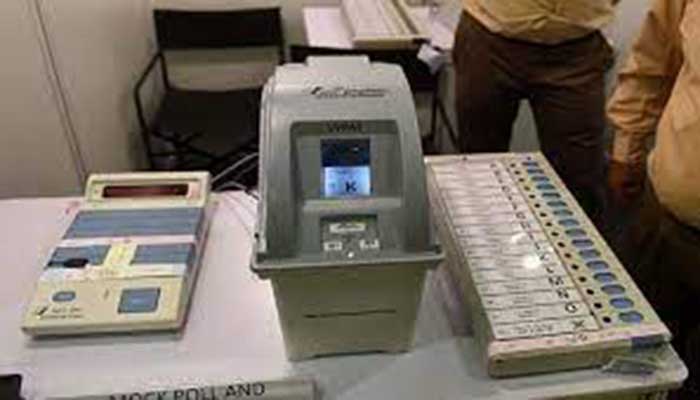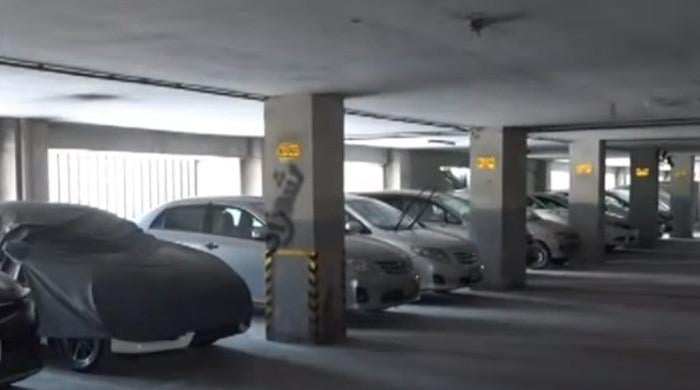2023 elections to be most expensive in Pakistan's history with use of EVMs: report
Consolidated estimates collected from election regulators suggest electronic voting arrangements will cost Rs424b to federal kitty, finds news report
December 16, 2021

- ECP estimates 2023 polls will cost federal kitty over a 1,000 times more than total of last three general elections.
- Employment of electronic voting arrangements for domestic and international voters accounts for a significant portion of expense.
- Estimated cost of next polls is close to budget allocated for country's largest province, Balochistan, for fiscal year 2021-22.
ISLAMABAD: With an estimated cost of Rs424 billion to make arrangements for electronic voting for 133 million native voters and 10 million overseas voters, the next general elections will likely be the most expensive ballot in the history of Pakistan.
These are the consolidated estimates that Geo News collected from election regulators, including the Election Commission of Pakistan (ECP), federal and provincial governments, political parties, donors, NGOs and candidates.
According to an estimate given by the ECP, the 2023 polls will cost the federal government roughly a 1,000 times more than the last three general elections, which totaled Rs28.6 billion. The employment of electronic voting arrangements for domestic and international voters accounts for a significant portion of the expense.
Moreover, the estimated cost of the upcoming polls is close to the budget allocated for the country's largest province, Balochistan, for fiscal year 2021-22, which was Rs584.1 billion.
It is estimated that nearly Rs47 billion will be spent on transportation, polling exercise, training, printing, remunerations and security, if the ECP goes with the traditional mode of balloting. But nearly Rs230 billion will be spent on electronic voting machines (EVMs) and its related expenses, while overseas voting operations are likely to cost Rs100 billion, say the major stakeholders.
The ECP will also have to pay Rs17 billion for security arrangements, as around 0.9 million security personnel, including around 20,000 private security guards, will be deployed at polling stations. Nearly 50,000 CCTV cameras will also be installed at polling stations on election day.
The stakeholders say election authorities will need roughly Rs100 billion as an expense on electronic voting tools to be specified for overseas voters. The final estimates, stakeholders say, will be prepared near the upcoming elections in 2023.
Pakistan spent around Rs22 billion on the 2018 general elections, Rs4.73 billion in 2013 and Rs1.84 billion in 2008, ECP officials say.
Experts analysing the election economy say that an additional Rs600 billion cost will emerge through candidates, supporters, financiers and media advertisements. Experts have also predicted an expenditure of Rs5,000 per registered voter in 859 constituencies (directly elected National Assembly and provincial assembly seats) in the country.
Under the new election law, candidates can spend Rs10 per voter (Rs4 million for an average voters’ pool of 400,000 for the National Assembly and Rs2 million for about 200,000 voters in the provincial assemblies). Experts say that generally contestants and political parties spend much more and their expenditures increase manifold while running their campaigns.
There is great confusion on the use of the EVMs as no one knows the exact number of machines required as well as their manufacturing and operations cost. The ECP officials estimate that the poll body would be in need of some 900,000 EVMs, with three machines at each polling booth. ECP officials counted 121.2 million registered voters on November 4, 2021, expecting an increase of 14% voters by October 2023, which would place the total number of registered voters at 133 million. The ECP plans to set up nearly 101,111 polling stations, comprising 310,000 polling booths in the upcoming general elections.
Three committees of the ECP are looking into all these matters, ranging from EVMs, electronic voting for overseas voters, administrative and legal matters and technical hurdles. The election regulators are looking at some renowned companies like Hart, ESNS, Dominion Voting Systems, Miru Indra and some local companies, to see if there are any options for the manufacture as well as the use of the EVMs. With the inclusion of global players, the price will start from around $1,500 per EVM, while locally manufactured machines would cost around $1,000.
If Pakistan acquires 900,000 EVMs from a third party, experts believe that each EVM would cost $1,500 (Rs262,500) which would collectively cost the national exchequer Rs230 billion. Experts say that if Pakistan locally produces EVMs, it may cost slightly over $1,000 (Rs170,000) per EVM, with a collective cost of Rs157 billion. The ECP officials also say that if one million overseas Pakistanis cast their vote, it would cost an additional Rs10,000 per vote, with a total cost of Rs100 billion.
Minister for Science and Technology Senator Shibli Faraz, told the Geo News that they have done their job after meeting all the requirements ECP gave them regarding EVMs. Legislation, discussions, procedures and necessary mocks have been exercised. Now it is ECP's job to execute all the formalities on how to use EVMs in the upcoming elections, he said.
The ECP told the Ministry of Science and Technology, “EVMs should use direct recording electronic voting technology rather than electronic counting of paper ballots. Strength of the current paper-based balloting system, like transparency, accountability and verifiability, must be maintained. EVM hardware and software should be auditable with voter verifiable paper audit trail. EVMs should be secure, accurate, reliable and verifiable.”
A senior official of ECP told this correspondent "the ECP is relying on recommendations of its committees. It [ECP] has a crystal view that the use of EVMs will be extremely difficult in the upcoming elections, citing multiple reasons."
So far, the National Database and Registration Authority (NADRA) has not received any instructions from the ECP to get involved in EVMs or internet voting software for overseas voters.
It is not clear how the ECP will manage this massive scale of the EVM project. The EVMs could also be acquired from some local manufacturers like from COMSATS, NUST or Telephone Industries Haripur or the Ministry of Science and Technology, Ministry of Information Technology and Telecommunication with help of a government-run institution, experts say.
Some foreign companies, Chinese firms in particular, were interested in supplying EVM-related technologies. The SmartMatic, Securetec, Dominion Voting Systems, Hart InterCivic and Election Systems and Software could become voting machine vendors for guidance and support during the elections.
Experts say these firms have the capacity to deal with most issues, including consulting on law, software, certification support and most importantly rolling out of the technology in the field.
EVMs cannot be implemented in a short time frame as the risk of failure is too high, experts say. Several countries have been unsuccessful in their attempt to implement the technology, with multiple reasons for failure, from poor vendor selection to deficient project management to inexperience.
Due to the short timeline, at peak, 5,000 voting machines need to be produced per day by any firm locally or internationally. Interestingly, Pakistan has never piloted this project in any form – neither in field tests nor in mock elections.
Many people fail to understand the complexities of using EVM in Pakistan and have unrealistic expectations of holding the 2023 election by using EVMs, observed Ahmed Bilal Mehboob.
"ECP has to select the type of machine and then finalise EVM specifications. After a manufacturer is selected, a few prototypes will be made for field testing. Machines' design may need to be refined accordingly. We need to amend our election laws to orient them to EVMs; about 30 sections may need to be amended," Mehboob said.
The EVM issue could be challenged in courts and it will take time to settle legal battles, he observed.
"Almost half the population and all opposition parties have no faith in EVMs. We will be the first country to attempt deployment of EVMs at this scale in one go," he told Geo News.











